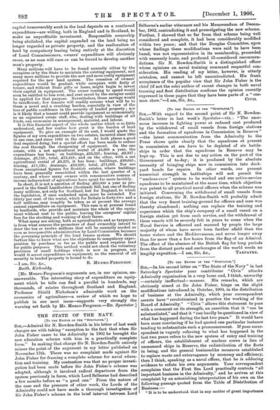THE STATE OF THE NAVY.
[To THE EDITOR OF THE " SPECTATOR:]
Sin,—Admiral Sir N. Bowden-Smith in his letter of last week charges me with taking "exception to the fact that when Sir John Fisher came to the Admiralty in 1902 he brought the new education scheme with him in a practically complete form." In making that charge Sir N. Bowden-Smith entirely misses the point of the argument in my letter published on November 17th. There was no complaint made against Sir John Fisher for framing a complete scheme for naval educa- tion and training. My contention was that no proper investi- gation bad been made before Sir John Fisher's scheme was adopted, although it involved radical departures from the system previously in force, which Lord Selborne had described a few months before as "a good one." From the nature of the case and the pressure of other work, the Lords of the Admiralty could not have made a thorough investigation of Sir John Fisher's scheme in the brief interval between Lord
Selborne's earlier utterance and his Memorandum of Decem- ber, 1902, contradicting it and promulgating the new scheme. Further, I showed that so far from that scheme being well considered and complete, it had been considerably modified within two years; and that the Douglas Committee, upon whose findings these modifications were said to have been based, was not representative in its membership, proceeded with unseemly haste, and produced ill-considered recommen- dations. Sir N. Bowden-Smith is a distinguished officer whose opinions on naval training command respectful con- sideration. His reading of my letter, however, is utterly mistaken, and cannot be left uncontradicted. His frank acceptance of the popular view that Sir John Fisher is the chief (if not the sole) author of recent changes in both naval training and fleet distribution confirms the opinion recently expressed in these pages that they have been parts of a" one- man show."—I am, Sir, &c.,






























































 Previous page
Previous page